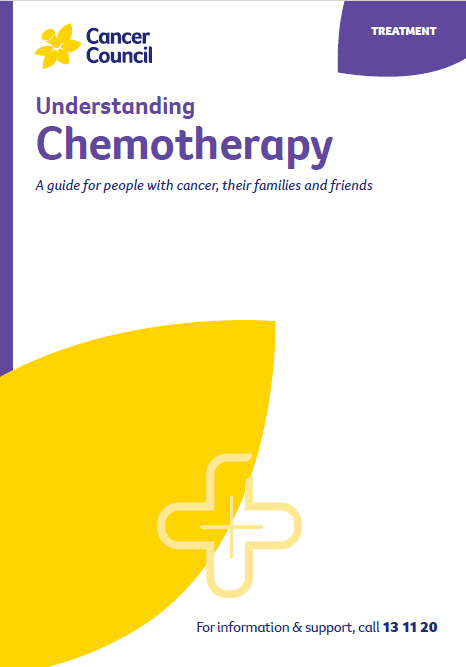- Home
- Ovarian cancer
- Treatment
- Chemotherapy
- Side effects of chemotherapy
Side effects of chemotherapy
Chemotherapy can affect healthy cells in the body, which may cause side effects. Not everyone will have side effects, and they will vary according to the drugs you are given. Your treatment team will talk to you about what to expect and how to manage any side effects.
Learn more about:
- Fatigue
- Nausea and vomiting
- Changed bowel habits
- Joint and muscle pain
- Risk of infections
- Hair loss
- Numbness or tingling in your hands and feet
Fatigue
This is very common during and after cancer treatment, but can also be caused by other factors. Your red blood cell level may drop (anaemia), which can cause you to feel tired and short of breath.
For more on this, see Fatigue and cancer or listen to the podcast below.
Nausea and vomiting
Some types of chemotherapy drugs may make you feel sick (nauseous) or vomit. You will probably be given anti-nausea medicines with each chemotherapy session to help prevent or reduce nausea and vomiting. Whether or not you feel sick is not a sign of how well the treatment is working.
Changed bowel habits
Some chemotherapy drugs, pain medicines and anti-nausea drugs can cause constipation or diarrhoea. Ensure you tell your doctor or nurse if your bowel habits have changed.
Joint and muscle pain
This may occur after your treatment session. It may feel like you have the flu, but the symptoms should disappear within a few days. Ask your doctor if taking a mild pain medicine such as paracetamol may help.
Risk of infections
Chemotherapy reduces your white blood cell level, making it harder for your body to fight infections. Colds, flu and viruses may be easier to catch and harder to shake off, and scratches or cuts may get infected more easily. You may also be more likely to catch a serious infection and need to be admitted to hospital. Contact your doctor or go to the nearest hospital immediately if you have one or more symptoms of an infection, such as:
- temperature of 38°C or above
- chills or shivering
- burning or stinging feeling when urinating
- a severe cough or sore throat
- severe abdominal pain, constipation or diarrhoea
- any sudden decline in your health.
Hair loss
Depending on the chemotherapy drug you receive, you will probably lose your head and body hair. Some treatment centres offer cold caps for your head, which may reduce the amount of hair loss.
The hair will grow back after treatment ends, but the colour and texture may be different for a while. If you choose to wear a wig until your hair grows back, call Cancer Council 13 11 20 to find out about wig services in your area. If you have private health insurance, check whether they’ll cover the cost of a wig because of hair loss related to chemotherapy.
For more on this, see our general section on Hair loss.
Numbness or tingling in your hands and feet
This is known as peripheral neuropathy, and it can be a side effect of certain chemotherapy drugs. Let your doctor know if this happens, as your dose of chemotherapy may need to be adjusted.
For more on this, see Peripheral neuropathy and cancer.
I kept a notebook to record my chemotherapy symptoms and any questions I had to ask my oncologist at each appointment.
Ann
→ READ MORE: Targeted therapy for ovarian cancer
Podcast: Managing Cancer Fatigue
Listen to more of our podcast for people affected by cancer
Dr Antonia Jones, Gynaecological Oncologist, The Royal Women’s Hospital and Mercy Hospital for Women, VIC; Dr George Au-Yeung, Medical Oncologist, Peter MacCallum Centre, VIC; Dr David Chang, Radiation Oncologist, Peter MacCallum Cancer Centre, VIC; Prof Anna DeFazio AM, Sydney West Chair of Translational Cancer Research, The University of Sydney, Director, Centre for Cancer Research, The Westmead Institute for Medical Research and Director, Sydney Cancer Partners, NSW; Ian Dennis. Consumer (Carer); A/Prof Simon Hyde, Head of Gynaecological Oncology, Mercy Hospital for Women, VIC; Carmel McCarthy, Consumer; Quintina Reyes, Clinical Nurse Consultant – Gynaecological Oncology, Westmead Hospital, NSW; Deb Roffe, 13 11 20 Consultant, Cancer Council SA.
View the Cancer Council NSW editorial policy.
View all publications or call 13 11 20 for free printed copies.
